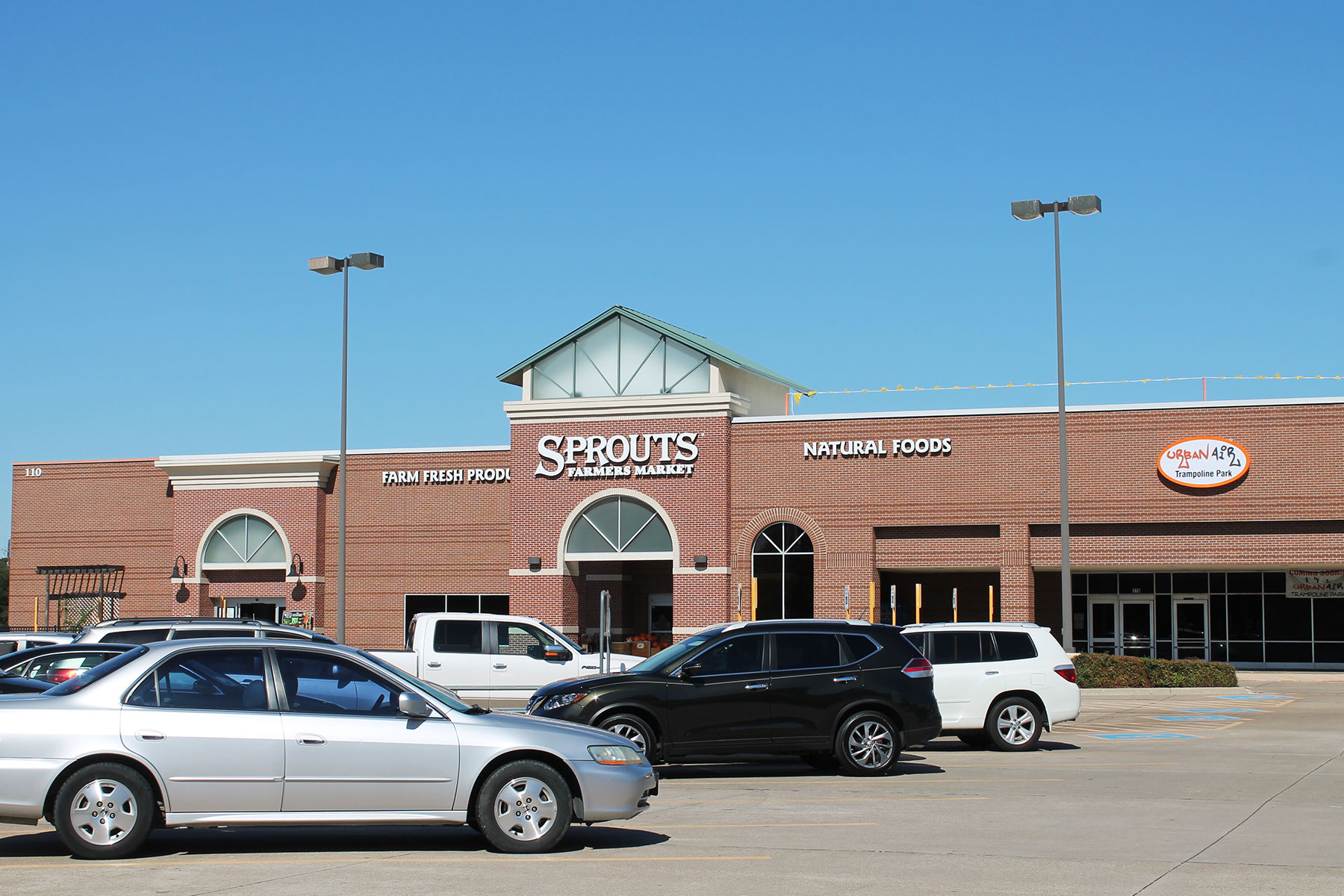A food fight has broken out in the opinion pages of the Dallas Morning News. Grocery chain Sprouts wants to build a new store in a neighborhood the News says “desperately needed” access to fresh produce. But Sprouts refused to follow the city’s zoning code in its planned construction, submitting to the City Plan Commission a series of faulty designs. So the Plan Commission denied the grocery’s request for special treatment.
The News’ editorial board believes this is an outrage. Sprouts was selflessly trying to bring loaves and fish to the masses, and couldn’t convince those crazy urbanists who want Dallas to look pretty, a choice the editors say“risks access to another source of fresh groceries.” Heartless!
But the News got a mind-boggling number of things wrong. Strap in, because this grocery saga contains multitudes. It involves the deeper question of when, and why, our city should set aside zoning laws meant to make our neighborhoods safer, cleaner, healthier, and happier. Sprouts could be a good, valuable neighbor to that part of Dallas. According to the City Plan Commission, it chose not to be.
To unpack the truth about grocery access in this part of town, let’s first sweep aside the News’ inaccuracies. First, there’s the headline, which says the store would be in “Southern Dallas.” Yes, if you drew a line across Dallas’ halfway point, this Sprouts would fall in the southern half. But the proposed location is on the northeast corner of Fort Worth and Hampton Avenues, where an Elrod’s Cost-Plus Supermarket currently stands.
This is farthest North Oak Cliff, just below Interstate 30 and adjacent to West Dallas. Standing in the parking lot, the Texas Rangers could slug baseballs onto I-30. It’s as “southern” as Sylvan 30 or the Methodist Dallas Medical Center.
Even if we grant that anything south of downtown is “Southern Dallas,” the editorial contains numerous errors of fact. The News wrote that the plan had “no drive-throughs on the entire site (despite having the right to build them).” But both the design PDF submitted to the Plan Commission and the cutesy, colorful rendering which the News published with its own editorial clearly show a standalone restaurant next to Sprouts—with a wraparound drive-thru lane.
The paper’s editorial writers are also at odds with themselves. They contend that this Sprouts is important for customers “who might want access to fresh groceries without a car” and say this is why they want to discard pedestrian-friendly design standards.
According to the submitted plans, the Sprouts would be surrounded by an ocean of parking lots, with exactly one pedestrian access point from the Fort Worth Avenue sidewalk (but none from Hampton, where the 101 bus stops). The grocery would install two bike racks but also a 30-foot-wide driveway, equivalent to a three-lane street. To create a perfectly flat parking lot, Sprouts would cut into the Fort Worth Avenue sidewalk by building a five-foot-tall retaining wall. The resulting sidewalk would be narrower than regulation. Sounds great for all those people who need fresh groceries without a car.
The News also argues that Dallas should expeditiously approve the project so that area residents can gain access to fresh, healthy food—even though the proposed restaurant with a drive-thru lane would almost certainly become a fast-food joint.
And, of course, the plan to build Sprouts in an area where fresh produce is“desperately needed” involves demolishing an existing grocery—Elrod’s Cost Plus—that already has a fresh produce section.
The editorial suggests that urbanism is a vanity project, better suited for “the actual Hamptons” (which, of course, are suburbs). But this corner of town—where two six-lane roads meet, next to an interstate, and near West Dallas’ heavy industry—needs to consider whether new development would add pollution and exhaust fumes. Urbanism isn’t about streets looking cute. Urbanism is about creating healthy spaces for people to live better lives.
The News doesn’t use the term “food desert” to describe North Oak Cliff, but it hints at that designation repeatedly in phrases like “help people get access to food they need in Southern Dallas.” This is silly. Beyond Elrod’s, El Rio Grande is 1.2 miles south, Jerry’s is 1.3 miles north, ALDI is 0.6 miles west, Cox Farms Market is 1.2 miles east, Tom Thumb is 1.5 miles southwest, and Ann’s Health Food Center is 1.9 miles southeast (I’m using walking distances).
I live nearby. When I complain about access to groceries in my neighborhood, my complaints are snobby food writer gripes, not real ones. (Tom Thumb always sticks cilantro in the parsley bin.) I know how fortunate I am in my grocery options. Yes, I would love to have a Sprouts at Fort Worth and Hampton, where it would be directly on my commute home. I would visit multiple times a week. But the Plan Commission can’t go on my wishes alone. Sprouts didn’t dish up a satisfactory design for the site, the commissioners contend. Rules are rules, and they knew the rules the whole time.
The good news for Sprouts fans, by the way, is that the company still has ample opportunity to present a legal design. “I don’t think this means we’re not going to get a Sprouts,” says Plan Commissioner Amanda Popken, who represents this part of Oak Cliff. “It just means the developer needs to try a little harder to build what the neighbors want.”
There is one more big point to make. You might be wondering why upscale Sprouts is so eager to serve a neighborhood full of what the News patronizingly calls “working people.” Well, that’s the biggest disingenuity in the News’ editorial. This store isn’t meant for “working people.”
This Sprouts would serve an area called Stevens Park. It’s one of the wealthiest enclaves in Dallas, with million-dollar homes built around a gorgeous golf course. Coombs Creek and its walking trail wind from here through equally well-to-do Kessler Park. The Bishop Arts District is an eight-minute drive.
In the opposite direction, western stretches of Fort Worth Avenue and Davis Street are filling in with new apartment and townhouse construction. To the south, Winnetka Heights and Kessler Plaza are thriving upper-middle-class residential neighborhoods. Since I moved just south of Kessler Plaza four years ago, the houses have been in a steady state of fixer-uppering. Teslas and Audis have replaced old pickup trucks. At dusk, the streets are filled with plump, collared, well-groomed cats.
“The development that’s going on along Fort Worth Avenue is all in line with the [planned development] zoning created two decades ago,” Popken says.“And now we’re seeing high-density mixed-use development being built as planned. We’ve got bike lanes going in on Fort Worth, we’ve got the new walk-up townhomes near Home Depot and walk-up restaurants across the street. We’re seeing the plan really coming together now.”
This is maybe the most contorted part of the News’ position. It believes an upscale grocery here is so important to providing equal access for all Dallasites that it wants the city to jettison the very same planning rules which were put in place to advance that equal access in the first place, and which appear to be working.
North Oak Cliff is an area where people of all economic statuses live in close proximity. It contains extreme poverty and extreme wealth. The News editorial board has a reason for erasing one of those groups, but I don’t know what it is. Sprouts wants to serve Oak Cliff for the same reason that Cox and Central Market do. They’re trying to target people like me. And I am perfectly happy to be targeted—if they can follow Dallas planning law and build a responsible store.
Having reached the end of this saga, you may be wondering why the Dallas Morning News editorial board put so much effort into arguing on behalf of an upscale grocery near a wealthy neighborhood. A more cynical person might say it’s because this is a real estate play. I prefer to think that it’s because they care about the working, disadvantaged, salt-of-the-earth people who just need a decent place to get fresh produce. People like me. I’m so flattered.
Get the SideDish Newsletter
Author






